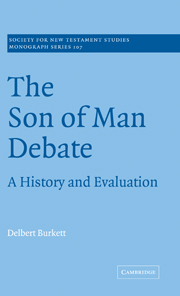Book contents
- Frontmatter
- Contents
- Preface
- List of abbreviations
- Introduction
- 1 Genealogical interpretations
- 2 The human Son of Man
- 3 The apocalyptic/messianic Son of Man
- 4 The question of reference
- 5 The question of authenticity
- 6 Miscellaneous sons of men
- 7 Exit the apocalyptic Son of Man?
- 8 The idiomatic/nontitular son of man
- 9 Son of Man in apocalyptic and rabbinic texts
- 10 Conclusions
- Appendix Surveys of research on “the Son of Man”
- List of references
- Index of passages
- Index of authors
- Index of subjects
2 - The human Son of Man
Published online by Cambridge University Press: 15 October 2009
- Frontmatter
- Contents
- Preface
- List of abbreviations
- Introduction
- 1 Genealogical interpretations
- 2 The human Son of Man
- 3 The apocalyptic/messianic Son of Man
- 4 The question of reference
- 5 The question of authenticity
- 6 Miscellaneous sons of men
- 7 Exit the apocalyptic Son of Man?
- 8 The idiomatic/nontitular son of man
- 9 Son of Man in apocalyptic and rabbinic texts
- 10 Conclusions
- Appendix Surveys of research on “the Son of Man”
- List of references
- Index of passages
- Index of authors
- Index of subjects
Summary
Patristic and medieval authors based their interpretation of ὁ υἱὸς τοῦ ἀνθρώπου on the Greek (or Latin) form of the expression. With the flourishing of Semitic studies after the Reformation, scholars recognized that Jesus would have spoken Aramaic or Hebrew rather than Greek. They searched behind the Greek expression for the underlying Semitic original. Lying close at hand they found the Hebrew idiom ben adam (Aramaic bar enash or bar enasha). Taking a step that has determined the course of “Son of Man” research ever since, they assumed that this idiom underlay the Greek expression.
As patristic authors recognized, the natural sense of the Greek expression is “son of the man” or “son of the human.” It would express a filial relationship between Jesus and a specific parent. The Semitic ben adam or bar enasha, on the other hand, translates literally as “son of man.” In this idiom, “son of ” designates an individual as a member of a group, and “man” specifies the group to which he belongs. The idiom therefore simply means “man.” With this recognition, scholars began to assume that the New Testament phrase expressed Jesus' humanity without referring to a parent.
As a designation for Jesus' humanity, the expression “ the Son of Man” might emphasize that which he had in common with humanity, either human nature per se or human nature in its lowliness and weakness. On the other hand, the definite article before the phrase might point to Jesus as the Son of Man par excellence, emphasizing that which set him apart as an extraordinary human being. These different possibilities gave rise to three varieties of interpretation: the Son of Man as the simply human, the lowly human, or the superior (ideal) human.
- Type
- Chapter
- Information
- The Son of Man DebateA History and Evaluation, pp. 13 - 21Publisher: Cambridge University PressPrint publication year: 2000



